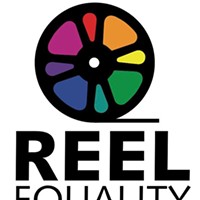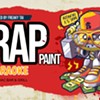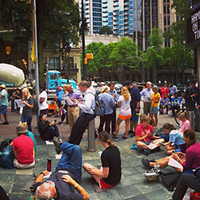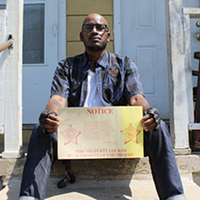Every year — probably every day — thousands of people chase the dream of being a published author.
In 2001, I made a $99 investment in my own literary fantasies. Eight years later, with nine books in print, I'm living the dream ... sort of. Sure, I write books that get published, but I'm stuck on what's known as the "mid-list."
A mid-list author, like me, is considered to be someone worth publishing because their books make money ... just not millions.
As an author of romance novels, my books aren't hardcover, which makes it even harder to get on the bestsellers list. But romance-themed books are some of the top-selling titles out there, especially when the cover price of a new novel in paperback is under $7 and hardcover novels are at least $25.
I've signed with an agent, and I have a contract with the New York publishing house Kensington Books. I've even tried to be prolific like Prince and push out a book a year. So far, it's been working. When reviewers get my books now, it's not a question of who I am anymore. But that still doesn't make me rich or famous.
But, it's better than it was when my first book went on sale via the Internet.
Print-on-demand publishing was just getting started, and I was working as a journalist in Winston-Salem, N.C. After I wrote the last sentence in my book, I recalled an interview I'd done with author Natasha Munson. Munson published a self-help book with the online service Iuniverse.com. I looked up the Web site, and that week they were running a special; I was so excited. I thought: "Hell, I'd blow $100 on something over the next week anyway; why not put it to good use?" Then, I'd either get the writing bug out of my system or I'd be the next Terry McMillan or John Grisham.
Keep in mind, I'd been trying to get published since high school and had foolishly sent my full manuscript to Penguin Books. (And yes, I still have that rejection letter.)
As the arts and entertainment editor at The Winston-Salem Chronicle, I'd been talking to a lot of authors who were self-publishing. It seemed to be the way to go to get your book out there.
What they failed to tell me, and what I didn't know, was that bookstores don't order books they can't return. And guess what's non-returnable? You got it: self-published books.
But I digress.
It took three months for my book, Searching For Paradise, to be published; there were revisions and a job change. I left Winston-Salem and went to High Point. Paradise was a coming-of-age novel based on the life of women just graduating from college. Like most first-time authors, I chose to write about something I had the most knowledge about. I was fresh out of college, and it wasn't at all what I thought it was going to be. I wanted my next book to be something different. And since the majority of my day was spent covering catastrophes as a police reporter with the News & Record, I needed a release.
That's when I decided to write my first romance novel.
In two months, I was done with my first draft. But unlike my first book, I wanted someone to pay me to be published, instead of the other way around.
This time, I did the research and found a publisher who accepted manuscript proposals from new writers without agents. That was me all day. And I was tired of searching for a literary agent -- because most of them were just scammers. Why pay a fee when reputable agents charge you nothing up-front?
I sent one prospective agent a query letter and some sample chapters; he wrote me back requesting the entire manuscript. When I received that letter, I pumped my fist and jumped around my apartment as if Publisher's Clearing House had just knocked on my door. This was a New York agent. Simon and Schuster is in New York. I was on my way ... or so I thought.
Two weeks later, the agent sent another letter that grounded me like a lead balloon: "I received your manuscript; however, your check for the $150 reading fee was not included. Please send the check as soon as possible or the manuscript will be destroyed."
Instead, this "agent" received a self-addressed stamped envelope and a request for my work back.
I would've given up, but my new book Revelations was special to me, and I decided to find my own publisher. I was determined not to go the self-publishing route again. Authors who have success publishing and selling their own books are a special breed. They have to go out and convince booksellers to give them a chance. Back in the day, there were plenty of independent bookstores that would allow a self-published author to come in and have a signing (for a percentage, of course). But many of those stores are gone now. And while online sales are great, I've learned that if readers like your books, they want to meet you. You'd better damned well hope they like you, too, because your sales will suffer if they don't.
I wanted my book on the shelves of bookstores. I had never read a story like mine, and I was sure that other people would relate to it or at least like it. Then, I'd be Nora Roberts. And my book would be made into a cheesy Lifetime movie, and I could move to New York and write from a sidewalk café all day. (Yeah, I had very unrealistic expectations. But, if you're going to dream, why not dream big?)
I joined every online writer's group I could find, hoping that networking with other writers would point me toward that coveted bestsellers list. By this time, I'd interviewed a dozen or so best-selling authors. They'd all had one common thread: They faced rejection before hitting the big time.
I could do this. I was born to do this. And then it happened: I received a letter that didn't say "no."
Genesis Press wanted Revelations. I thought this was fitting and funny. Less than three years ago, they'd turned down my first book. At the same time I was offered a contract from Genesis, I found an ad from a new literary agent out of Maryland. Though I had been offered a two-book deal, something told me to go ahead and reach out to this agent. I had hopes that I wouldn't be greeted by another scam or rejection.
I e-mailed Sha-Shana Crichton and, to my surprise, she e-mailed me back the same day. My synopsis had caught her eye, and she wanted the entire manuscript. Yes! When I told her that I had been offered a contract, she seemed even more interested in signing me as a client. And signing with her was a good thing because she renegotiated the contract that I was ready to sign and secured a better two-book deal for me as well.
It was 2002, and I knew it was only a matter of time until I was sipping espresso in Greenwich Village.
What I didn't know was that unless you're with a large publishing house, like a Random House, and your name is Dan Brown or Eric Jerome Dickey, you've got to do your own publicity.
It'd be great if people just picked up your book because they wanted to give a new author a chance, but that isn't the case. Just read the reviews of books on Amazon.com.
And when authors call bookstores and ask to set up a signing, the response isn't very positive. It's as if the bookseller is wondering, "If you're going to sell so many books, why are you calling and not your publicist?"
But who could afford to pay a publicist upwards of $400 a month? That money doesn't guarantee that you'd get coverage in regional, local or national publications or that your book would be reviewed.
I figured: If I can write a book, I can write a press release. It also helped that, working as an editor, I saw press releases on a daily basis; some were good, some bad. So, I tried being my own publicist for about a week, and let's just say a full-time job, a deadline for book two and life in general made it a little difficult to keep up with details like who had received a press release and the location of my next signing.
Thank God for friends. One of my good buddies works in public relations and was ready to start her own company right around the time that I realized I needed a publicist. We came to an agreement: She handed over her contacts, and I sent out the press releases from her e-mail address.
It worked. By 2006 when my book, The Business of Love, was released, I was finally getting the publicity I wanted.
Book signings are another way to meet the public and another way to find out that being famous on MySpace doesn't always translate into sales.
I've had the pleasure of attending some great signings -- like the time the Charlotte-Mecklenburg Public Library hosted me at the Beatties Ford Road branch the day after Valentine's Day. While my ego would love to take the credit for packing the house, it was probably the free chocolate that got people in the door.
I've been invited to discuss my work with two book clubs in Charlotte and one in Jacksonville, Fla. Those women take to your books and while you're in their presence, you feel like your work actually matters. You can look over your shoulder and see Hollywood calling.
Then, you have an experience like the one I had in Columbus, Ga.
Part of me always looks for a chance to get to Atlanta. A few of my books have been set in Atlanta, and when I was invited by a book club to come to Columbus for a meeting, I jumped at the chance. The meeting was on a Sunday, so that meant I could spend Saturday in Atlanta with my best friend. I was looking forward to this meeting, hoping that I was really expanding my reach and would soon be off the mid-list.
Columbus is about two hours from Atlanta, which makes it about six hours from the Queen City -- and that's not counting traffic and road construction.
So, we were to meet at a local Cheddar's restaurant; however, when I arrived, there was only one person in attendance. Part of me wanted to turn around and leave, especially since I had thoughts of canceling earlier that day. But I took a deep breath and decided to stay. The conversation was great, and after dinner, I was ready to go. But, another book club member showed up. Now, I could say two people in Columbus knew who I was.
The drive back to Charlotte was hell on wheels. When I got on to I-85 North, a wave of sleepiness washed over me. I was too far from my friend's house to go back and too close to South Carolina to stop. "This is just great," I said aloud as I rolled the window down to let the cool air slap me in my face. "I'm going to die before I make it to Oprah." I think laughing at myself (and nasty truck stop coffee) kept me awake long enough to make it back to Charlotte.
Once you show a bookseller that you can sell books, they don't mind having you back for a signing. But in these economic times, it's nothing to call up a store where you had a good showing only to find out that it's permanently closed.
This happened to me in both Atlanta and Raleigh.
The former B. Dalton at Crabtree Valley Mall was the first place I really felt like a star. By the time my 2006 titles, Second Chances at Love and The Business of Love were released, B. Dalton was closed.
And as plans were being made for my book tour in support of More Than He Can Handle, my favorite store in the Atlanta area, Waldenbooks in North DeKalb Mall, was no more. That bookstore had the perfect location for a signing: right next to the bathroom and the movie theater. People couldn't help but stop by your table. Most of the time they bought a book; but more often than not, you got people who would say, "I'll be back." And when they did return, they zoomed past you so quickly, you forgot that you were supposed to sell them a book.
Dealing with chain bookstores when you're not a bestseller is akin to pulling teeth at times, even with a publicist. Phone calls go unanswered, and messages and e-mails don't get returned. It's enough to make you want to scream. But Charlotte is a city with great independently owned bookstores and booksellers who want to help local authors. And let's be real: When a bookstore hosts a signing, the store isn't taking a big risk because what books they don't sell they can return -- unless the author signs every book. (Yes, I've done that before.)
Being a mid-list author means you're always in danger of losing your contract, so you do whatever you can to get those numbers up. You have book signings in hair salons, you send out 1,500 e-mails each week and you pray that someone connected to Oprah reads your book.
But all that said, all you can do is hope that the reviews are kind.
They aren't always.
Of course, one person's one-star book is another reader's favorite. A lot of times, a critic's favorite isn't always the author's top pick.
For instance, Let's Get It On was one of my favorite titles. I wrote about Charlotte, football and sex. It gets no better. Romantic Times Magazine didn't like it so much.
In a two-star review, the magazine said, "there's no connection, emotionally, to the main characters, which makes it hard to cheer for them."
Getting a bad review is like someone telling you that your child is ugly. I've always believed that I can learn from each review, good or bad -- but, hey, it stings.
Then you read what the readers have to say.
"I loved this book!" D. Lee wrote on Amazon. And countless other e-mails I received about this book just let me know that you can't please everybody.
It takes a lot to make it on the mid-list. I'm more than aware that there are plenty of people who'd like to be in my shoes. I'm thankful to have a contract, especially when Publishers Weekly constantly reminds you that the publishing industry is in big trouble with layoffs at big publishing houses. Maybe that's why being a bestseller has become part of my mission these days.
That's also why it's good to have friends and family on board with your dream. So many times my sister has been in Wal-Mart and sold my book to a shopper wandering around the book section. My mom sells my books in church -- and I'm certain we're going to hell for that because these novels are really steamy. When my dad was waiting for a kidney transplant and had to undergo dialysis, he got his nurses hooked on my books.
So, my plan for 2009 is to kick it up a notch. It's time to step out of my comfort zone and hit cities that I've never visited before to build a bigger fan base.
I'm hoping that if I make the right moves, then maybe I'll be able to write my own happy ending.
Latest in Cover story
More by Cheris Hodges
-

Statewide film series set to fight N.C. anti-gay amendment
Dec 15, 2011 -

N.C. governor vetoes repeal of Racial Justice Act
Dec 14, 2011 -
More Democratic in-fighting
Dec 13, 2011 - More »
Calendar
-
An Evening With Phil Rosenthal Of "Somebody Feed Phil" @ Knight Theater
-
Kountry Wayne: The King Of Hearts Tour @ Ovens Auditorium
-

NEW WINDOW GALLERY-Pat Rhea-ACRYLIC PAINTINGS-April 05-30 2024 VALDESE, NC 28690 @ New Window Gallery/Play It Again Records
- Through April 30, 12 p.m.
-

Trap & Paint + Karaoke @ Zodiac Bar & Grill
-

LIVE MUSIC FRIDAYS!!! @ Elizabeth Parlour Room
-
Holiday Gift Guide
26 ways to shop local this holiday season
-
Fall Guide: Upcoming festivals, comedy shows, visual arts events and more
-
Halo 4 earns critical hallelujahs
Plus, news on Mass Effect Trilogy, LEGO: The Lord of the Rings











